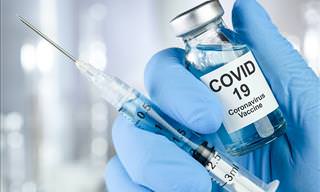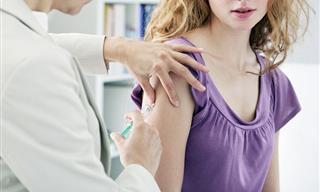This isn’t all. Another study from the researchers at the CDC published in the Journal of the American Medical Association (JAMA) found that all 19 of the reported anaphylactic reactions to the Moderna vaccine were experienced by women. Furthermore, 44 of 47 anaphylactic reactions to the Pfizer-BioNTech vaccine occurred in women.
So, is this something to be concerned about?
Why are women developing more side effects from the COVID-19 vaccine?
According to experts, these study results aren’t something to be worried about. Firstly, there’s a lack of research to clearly state why the side effects of the vaccines are stronger in women.
"I don't think there's enough information to be able to draw any strong conclusions about why this may be occurring more in females than males," says infectious disease expert Amesh A. Adalja, MD, senior scholar at the Johns Hopkins Center for Health Security.
See Also: 8 Dangerous COVID-19 Vaccine Rumors You Shouldn’t Believe
Whatever evidence we do have on this subject isn't exactly alarming. Experts believe that women’s immune system is just more reactive, and past studies have suggested that females have higher antibody responses than males to certain vaccines, even the flu shot. A 2013 study published in the journal Vaccine examined reports of side effects after the 2009 H1N1 vaccine and noted that females between the ages of 20 and 59 reported higher rates of allergic reactions than men, even though more men received the vaccine than women.
Experts also suspect that the levels of estrogen in women, especially premenopausal women, allows the activation of the immune response to illness and, hence, to vaccines as well. Men, meanwhile, have more testosterone, a hormone that can slightly soften the same response.
Interestingly, though, the authors of the CDC report are not surprised by the findings. “Women generally develop stronger immune responses, including high antibody levels and greater T-cell activation, which can lead to more rapid control of infection but may also lead to increased reactogenicity (side effects) after vaccines,” says lead author Julianne Gee, MPH, a CDC epidemiologist. More research on the subject would provide a clearer idea of the differences in immune reactions in men and women in the future.
What should women do to deal with the vaccine’s adverse reactions?
While it is true that women have been experiencing more side effects from the COVID-19 vaccine, that doesn’t mean they should be deterred from taking the shots altogether. It would be better to experience these side effects than being sick with COVID-19.

Vaccination is an important and, perhaps, the best prevention tool we have to prevent the deadly disease and its complications. So, even though the adverse reactions to the vaccine may be stronger in women, they will go away in a day or two. Taking the vaccine is vital for our long-term protection and its benefits far outweigh the risks.
The CDC says that you can take OTC medication like ibuprofen, acetaminophen, aspirin, or antihistamines to address any discomfort you experience after receiving the vaccine. It also recommends drinking plenty of fluids if you develop a fever after the shot. Read our article on Managing and Preventing the Side Effects related to the COVID-19 vaccine for a better understanding.
See Also: Do You Need to Get Vaccinated if You've Already Had COVID-19?
Experts predict that the vaccine doses could become more individualized over time, and people may be able to choose from a menu of vaccines depending on their individual needs. Researchers will also look at age and sex in order to develop the most effective vaccines with the least side effects for all genders. But for now, whether you are a man or a woman, experts say we can safely roll up those sleeves and get the shot.
Share this information with your loved ones...
 Go to BabaMail
Go to BabaMail
























































